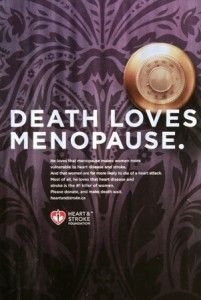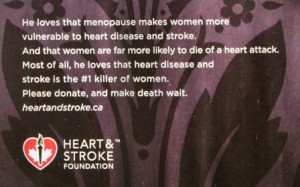The Heart and Stroke Foundation of Canada has inaccurately branded menopause as a killer of women. I will not be sending them a donation.
Last October, the foundation launched a fundraising campaign called Make Death Wait. Magazine and TV ads personify death as a man with a disembodied voice (he sounds like a stalker) who says he loves women (and men) and is coming to get them.
Eileen Melnick McCarthy, director of communications for the foundation, wrote to me in an email that the intent of the campaign is to “wake up Canadians to the threat of heart disease and stroke.” The campaign – urging viewers to “make death wait” by making a donation – has drawn both support and criticism.

Note the stereotypical hot flash reference: The thermostat is set at 15 C (60 F) but reads 23 C (73 F).
I think the TV ads are creepy, but what disturbed me more was the Death Loves Menopause message in the December issue of Chatelaine, Canada’s oldest women’s magazine. The small print reads: “He loves that menopause makes women more vulnerable to heart disease and stroke.” But is this statement defendable?
Dr. Jerilynn Prior, endocrinologist and scientific director of the Centre for Menstrual Cycle and Ovulation Research, wrote in an article about women’s risk for cardiovascular disease that the assumption heart disease in women is caused by estrogen deficiency associated with menopause is a myth:
The reasoning behind this notion goes like this—young women have lots of estrogen and don’t get heart attacks. Older menopausal women are “estrogen deficient” and get heart attacks. Therefore, lack of estrogen causes women’s heart disease. That is like saying that headache is an aspirin-deficiency disease!
It is true that heart disease and stroke is the #1 killer of women, but the ad’s assertion that it is menopause that makes women more vulnerable raised the ire of women’s health experts I asked for comment.
Joan Starker, a PhD clinical social worker specializing in midlife, menopause, and aging issues, called it “an appalling and shocking advertisement.” Starker says she and her colleagues have “worked hard to shatter negative conceptualizations of menopause and aging. When I viewed this ad, I was left with only one horrifyingly toxic message – menopause equals death – which is ageist and sexist.”
Barbara Mintzes, assistant professor at the University of British Columbia, calls the ad “misleading and inaccurate” and says “there is no sudden shift in the rate of heart disease post- versus pre-menopause (or around age 50), as would be expected if menopause was a major risk factor for heart disease. As women age our risks of heart disease gradually increase, similarly to ageing in men.”
My fellow blogger, Paula Derry, is a PhD health psychologist who critiques, analyzes, and theorizes about menstruation research/theory, with menopause being one of her specialties. “The idea that women’s risk of heart disease increases after menopause is a common one, yet there is little evidence for any increase in risk, much less that menopause is a key cause of heart disease and death,” she says.
Derry cites a 2011 paper in the British Medical Journal – Ageing, menopause, and ischaemic heart disease mortality in England, Wales, and the United States – that concluded aging rather than menopause was key: “Heart disease mortality in women increased exponentially throughout all ages, with no special step increase at menopausal ages.”
Last March, the American Heart Association issued the Effectiveness-based Guidelines for the Prevention of Cardiovascular Disease in Women—2011 Update. These guidelines present a long list of risk factors such as obesity, poor diet, physical inactivity, high cholesterol, hypertension and diabetes. Menopause is not included as a risk factor and is mentioned in just one sentence in the document.
As Derry says, “If I were going to donate money to an organization it would not be to one that tried to scare me with what I understand to be inaccurate facts.”
The Heart and Stroke Foundation of Canada should “wake up” to the truth about heart disease and menopause.



The Heart and Stroke Foundation of Canada has gone too far with these commercials and advertisements. It’s known as shock advertising – intended for us to invest in the product – or in this case, the cause – thinking we will be saved somehow if we do.
These advertisements are for fundraising and really offer us no solution, no safe place or feeling. They only play on our fears and emotions leaving us, who are at risk, in fear and despair.
It’s emotional blackmail, which is a low-blow for a such a prestigious organization.
I couldn’t agree more. Advertising campaigns such as this are problematic in a number of ways. Firstly, it is not scientifically sound. Second, it suggests that women are powerless to stop heart disease, save for donations to the Heart and Stroke Foundation, rather than addressing the ways we can care for ourselves and the social contributors to heart disease, including lack of access to wholes foods and urban planning which facilitates safe physical activity. Finally, It portrays heart disease in term of sexualized violence, which is offensive and disturbing.
I share Laura W. frustration with the Heart and Stroke ad. I am even scepitcal about heart/vascular disease being the number one killer of women–after all, if a person (man or woman) dies of old age, their heart stopped. Right? If death is sudden (how I would wish to go when I am old) or there is no clear cause for the death besides being older (like pneumonia), then the physician simply writes “heart disease” as a cause of death. Not scientific at all.
I’ve seen these advertisements and actually tune out. I didn’t know why but Wershler’s explanation resonates with me. Emotions do rouse us to action but stirring unfounded fear seems unehtical. Good on you Wershler for questioning ‘the truth.’
I want to thank all of you for touching on other important elements of this issue. It’s impossible to include them all in one post. Your thoughtful comments have expanded and enhanced the deconstruction of this media message.
This piece, in an expanded version, has been published by Troy Media. Here’s the link:
https://www.troymedia.com/blog/2012/02/10/death-loves-menopause/
Thank you Laura for being an excellent advocate for women’s health. It would seem to me that the pharaceutical world will go to any measure to create more fear around aging and death. I guess we will have to die but lets not think of it with fear but as a gentle transition and we can live a healthy life until that time.
Thank you, Laura, for the links to your excellent post. As you know, I’m in complete agreement with you. This stuff makes me mad. And if death really did menopause so much, how come the retirement homes are filled with women?
The version of Death loves Women that I found included a mysterious mini-noose made of rope. Guess they removed it.
That is strange. You may have seen a photo I took of the ad that included the handle to my camera in the bottom right hand corner. Does that sound familiar? Where did you see/find that photo?
I bet it was your photo – found it here: https://sextherapistintraining.tumblr.com/
specifically, here:
https://sextherapistintraining.tumblr.com/post/13462754244/ummm-can-we-say-pretty-shitty-advertisement
The Heart & Stroke Foundation of Canada sponsored “Land of the Lost” on TV recently. Lots of “Make Death Wait” commercials. Glad to see they’re spending all those donations edumacating the public with sciency stuff like this:
https://www.imdb.com/media/rm2240514048/tt0457400